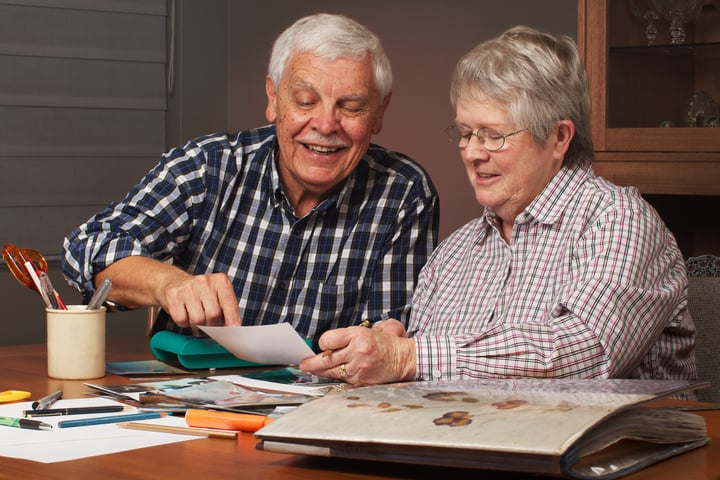
When someone you love is diagnosed with dementia, it can be equally devastating for them and you. In a previous blog, we explored some of the initial steps you should take after an aging parent or spouse receives such a diagnosis. However, once you’ve done your research and prepared your loved one for a possible move into memory care, you might find yourself wondering, “what should I do next?”
One of the most important things you can do is spend time with your loved one and cherish every moment you have together. A great way to do this naturally is by creating a scrapbook — although there are plenty of benefits to this hobby beyond quality time.
Why Dementia Caregivers & Their Loved Ones Should Scrapbook
1. Improves Cognition
One way of creating a scrapbook can be beneficial to those diagnosed with dementia by allowing them to think about cherished memories actively. Just like someone might forget a language they learned after a period of unuse, it’s best to encourage your loved one to remember as many memories as possible. Doing so will strengthen their cognitive skills and keep their mind active and engaged.
2. Eases Stress
By spending time together and genuinely appreciating each moment, your loved one will benefit greatly from engaging with you. We all cherish the time we spend with loved ones, but quality time is significant for dementia caregivers. Spending this time together will create memories that you will hold on to for a long time, making the recent diagnosis easier on a caregiver.
3. Keeps Memories Alive
As we age, it’s normal for memories to fade. Fortunately, scrapbooking can sometimes jog key memories. It can also serve as a reminder in the future. You and your loved one to look back on and think about the memories within the scrapbook, as well as those you created while making it.
4. Creates Feelings of Achievement
Creating something like a scrapbook can make a senior feel incredibly accomplished. This sort of feeling can improve their well-being, self-esteem, and general health. By working on a project with your assistance, they can know that the project will get done.
Getting Started with Scrapbooking
The benefits of scrapbooking with a loved one with dementia or Alzheimer’s are apparent. Still, there are a few things you can do to make the project go more smoothly. Begin by gathering together any scraps or items that you want to include in the scrapbook. These could be old photos, pieces of fabric, small keepsakes, or anything else that could spark happy memories.
It’s also a good idea to find exterior photos that could help stimulate memories, as well. Try to find pictures of your loved one’s school or first job. While they might not be perfect, they could help elicit some new memories. If you can, consider taking them to visit key places from their history. Even if you can’t go in, passing by a significant place might help them remember a new detail, and it will be more time the two of you can cherish together.
Finally, when you’re creating the scrapbook, organize it by sections rather than years, as dates can be easily confused. Instead, create a section about their first job or their school life. Add sections so they can categorize their stories, even if they aren’t in chronological order.
If you’re looking for other ways to cherish every moment with your loved one, moving to a professional memory care household can be an excellent option. Communities like Cincinnati’s Marjorie P. Lee can help shed the burden of managing medications, preparing nutritious meals, and providing daily care. Memory care households also give your aging parent or spouse access to safe, comfortable housing, round-the-clock nursing care, and innovative therapies to help them live well into the future.













